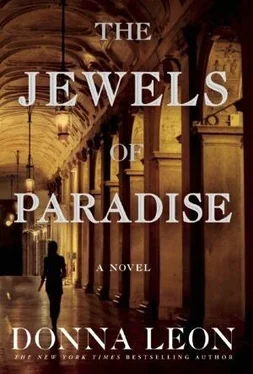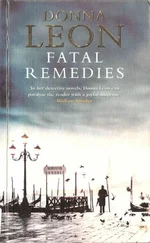“ Oddio ,” she repeated, thinking of the man in the portrait, with his pudgy, beardless face and his look of patient, unbearable sadness.
SHE WOKE AT NINE THE FOLLOWING MORNING. AFTER FINDING that word, musico, the previous evening, all she had been able to do was make herself some pasta, finish the bottle of wine, and go to bed with the second of the books she had taken from the library. But by the time she got under the covers, she was too tired, or too sodden, to be able to follow much of what she read, and she fell asleep, only to wake in the night, close the book and put it on the floor, turn off the light, and go back to sleep.
There was no sign of the Bear family when she went into the kitchen to make coffee the next morning, and their kitchen looked as clean as her own did not. “I think it’s time you started having a life, Caterina,” she said to herself as the coffee began to bubble up in the pot.
“Or a job with a future,” her more sensible, pragmatic self added.
She wondered if this is what happened to unemployed musicologists: they ended up in rented apartments filled with Ikea furniture, looking into the windows of their neighbors for reminders of human life. In order to give herself a sense of purpose, she did the dishes from the night before and put the empty wine bottle—telling herself it had been less than half full—into the plastic container meant to hold glass and plastic garbage. That was one positive change in the city since she’d moved away, differentiated garbage collection. The thought depressed her, not that the city had such a thing but that she would measure progress in these terms. No new ideas, no new politics, no influx of young people with houses and jobs, only paper on Monday, Wednesday, and Friday and plastic on Tuesday, Thursday, and Saturday. On Sunday, God and the garbagemen rested. It would make a stone weep; so would the fact that most of her friends believed that it all ended up in the same place, anyway, and the whole thing was merely a scam to enable the company that did the collecting to raise the price. She abandoned these thoughts and went to take a shower.
A half hour later, after stopping for a brioche and another coffee, she walked out onto Riva dei Sette Martiri, having decided to take advantage of the sun and bask in beauty on her way to work. The golden angel seemed to dance in the breeze from his post on top of the bell tower of San Giorgio. The sight of it lifted her spirits to such a degree that she wanted to wave at him and ask him how things were up there.
She remembered something the Romanian, in one of his rare moments of sobriety, had asked her once: how was it that angels got dressed? In response to her astonished look, he had insisted he was quite serious, and she was the only person he could ask. “I see how their wings come out when they get undressed—that’s easy, the cloth passes the right way over the feathers—but wouldn’t it disturb their feathers to have to push them through their sleeves when they put them on?” It was evident that this lack of certainty troubled him. “Do they have buttons?” he asked.
Her visual memory had summoned up Fra Angelico’s Annunciation in Florence, the angel kneeling, starstruck, before the baffled virgin. His multicolored striped wings stuck out behind him. Of course the girl looked puzzled. The Romanian, she had to admit, had a point: a careful angel could probably fold them up and unbutton his side vents when he put his robe on, but slipping them through would still snag a lot of the feathers. Slipping them off would be easier, for the cloth would run along the feathers easily. Maybe, being angels, they never needed to change their clothes?
Illumination came and she had smiled at him with an all-knowing expression. “Velcro.”
“Ah,” had escaped his parted lips, and he bent to kiss her hand. “You people in the West know so many things.”
She turned in just before the Church of the Pietà and worked her way back past the Church of the Greci until she arrived at the Foundation. She let herself in, stopped in Roseanna’s office, but there was no sign of her. She opened the door to the stairs and went up to the director’s office, let herself in, and set her bag on the table. She unlocked the storeroom and took the packet of papers she had left in the smaller trunk. Leaving the doors open, she went back to the table, set down the folder, and took out her notebook. Whispering the word musico, she resumed reading the papers where she had left off the day before.
There was an affectionate letter from a priest in Padova, apparently a childhood friend, who told his “Dear friend and brother in Christ, Agostino,” that the various members of his own family were all well and, with the help of God, would so remain. He sent his wishes and prayers that the same would remain true for his friend Agostino’s family. In the absence of substance, all she could do was note the date of the letter.
The next was a document from October 1723, containing a list of the candelabra, books, relics, and paintings left to the church of Saint Andreas in Düsseldorf by a certain Johann Grabel. The candelabra were in brass and silver, the books all on religious themes, the relics a series of desiccated extremities, including the big toe of Saint Jerome. “Left or right?” Caterina asked aloud. The paintings were portraits of saints, with a heavy preponderance of martyrs. Below this list was written, in Italian, in that backward hand, “To the Jesuits. Fool.” She made a note and passed the document to her left.
She continued like this for another two hours, finding a random sample of letters from the later part of his life, and all addressed to him, that contained requests for help of one sort or another, praise, ecclesiastical news, and more than a few requests for payment for articles such as wine, books, and paper. The letters came in from all over Europe, but strangely enough none of them made any further reference to music or to Steffani’s work as a musician. For all the evidence found in these papers, he might have been a clergyman and only that all of his life. By the time she got to the last of the papers in the packet, there had been just that letter and the single aria to give evidence to a life beyond the Church.
She pushed the papers away from her and rested her chin on her palms and found herself thinking about her family. They had been lucky in one thing, that none of them had had to survive the death of a child. One of her aunts and two of her uncles had died relatively young, but not before their parents and not before having had children. Two of her sisters had children, whom they loved to distraction. And she still had time to have them. Here, her inner cynic broke in to observe that, in a decade, it would probably be normal for women in their fifties and sixties to have children, so there was no sense of urgency, was there?
What was it, though, to know you’d never have them and not through your own choice? Would it bother a man to the degree that it tormented women?
She had never been much curious about the sex lives of the castrati, had not bothered to see the film about Farinelli some years ago. She had read a number somewhere, years ago, of the tens of thousands of boys to whom it was done, all in the hope of producing a star. The lurid novel lying on the shelf in the Foundation’s library could lie there until doomsday for all she cared. She had never bothered to speculate about what they did or did not do, and she knew she did not care. She wondered only what they lost in terms of the bonding that came with it, and was that worse than knowing there would be no children, no one to pass things along to, no one to teach or tickle? Was this the message in that sad man’s eyes?
Читать дальше












